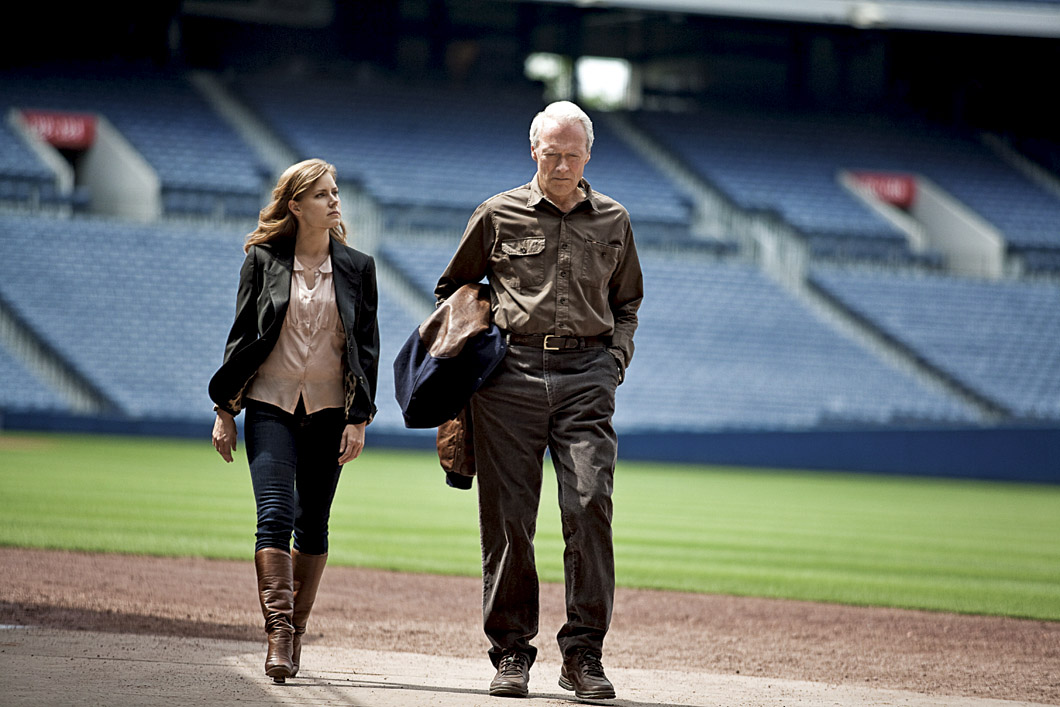Eastwood has trouble with 'Curve'
Friday, September 21, 2012
In an instance of very bad timing, Clint Eastwood's latest role features the actor grumbling at more inanimate objects than at any other point in his career. "Trouble With the Curve" begins with Eastwood's character audibly coaxing his own urine into a toilet. Later, he sings "You Are My Sunshine" to a gravestone.
He doesn't talk to any furniture, but he does kick a coffee table across the room. Read into that whatever statement about the current presidential administration you choose.
"Trouble" is second-rate Eastwood, existing in a parallel universe where the celebrity has been reduced to a Hallmark movie-of-the-week actor, not one of the most respected directors in Hollywood. Unlike some of his better recent acting outputs, this is a blunt subtlety-free performance. To use a baseball metaphor - and be prepared, you'll hear one every 12 seconds in this movie - "Trouble With the Curve" has a problem tipping its pitches.
All of that said, there's at least one member of your family who will declare this their favorite movie of the year. It's a Hallmark-style film, but so was "The Blind Side," and that got nominated for a Best Picture Oscar. Plus, Justin Timberlake is in this. That guy is like cinematic truffle oil. He makes everything a little bit better.
Eastwood is Gus, a legendary but aging scout for the Atlanta Braves, who is so old that he drinks Schlitz and says words like "Interweb." He's a single father who failed in raising his commitment-phobic daughter Mickey (Amy Adams), who has one scene where she falls asleep literally spooning a legal brief. Gus' old friend Pete (John Goodman, doing his best Wilford Brimley) convinces Mickey to travel with Gus while he scouts a prima donna high-schooler. This kid is so ridiculously evil you'll half expect him to punch out a ballboy during the homerun trot, then twirl a handlebar mustache as he crosses the plate.
Adams and Eastwood are very good actors strapped with Julia Roberts Syndrome. They're completely unsympathetic characters; we're supposed to root for them simply because they are played by popular actors.
Things improve immeasurably when Timberlake shows up as a former Gus-approved prospect who hopes a scouting assignment leads to play-by-play work for the Boston Red Sox. Timberlake is wholly sympathetic, and his scenes with Adams make her character likable by association. Gus helps the movie's cause by doing cool Clint Eastwood stuff, like breaking a bottle and threatening a guy in a bar.
"Trouble" director Robert Lorenz, a longtime first-assistant director on Eastwood's movies, leaves nothing left for the audience to ponder. But he knows how to please the crowd. Every detail, from the adorable group of aging scouts Gus hangs out with to the bars they drink in, seem designed to drop audience blood pressure. By the time the movie hits its inside-the-park homerun of a ridiculous but satisfying ending, audiences likely won't care.
One final note: This movie criticizes the "Moneyball" credo at every turn, but it has some of the worst baseball scenes in recent memory. Why, except as a script convenience, is the scrawny high school kid with glasses who is scared of the ball hitting one place before the best player on the team? Even Morris Buttermaker knows to put the scrawny kid ninth, behind the pitcher.
